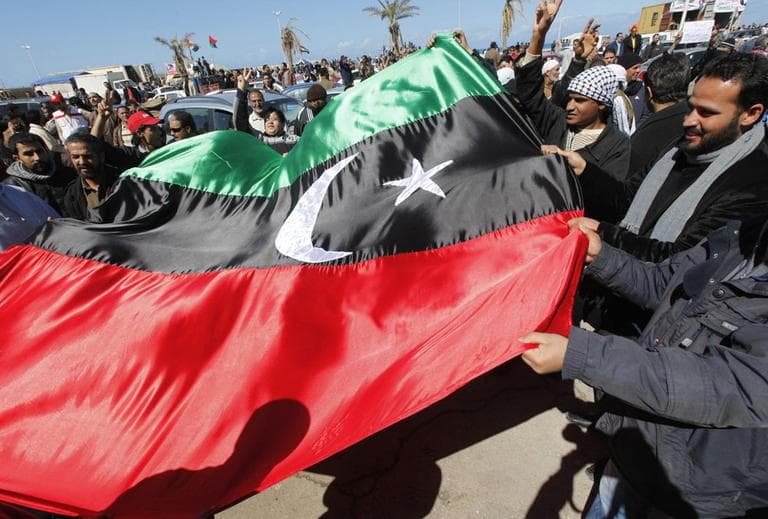Advertisement
U.S. Presses For Tough Sanctions On Libya

The United States pressed its European allies on Monday to set tough sanctions on the Libyan government, while doubts emerged about the feasibility of a proposed no-fly zone to prevent Moammar Gadhafi's regime from launching aerial attacks against protesters.
U.S. Secretary of State Hillary Clinton was making the Obama administration's case for stronger action to foreign ministers from Britain, France, Germany and Italy as part of a series of high-level talks in this Swiss city. But the European Union's top diplomat, Catherine Ashton, sidestepped the question of how quickly the EU would act, saying the goal now was for governments to work "in a coordinated way."
The Obama administration has declared it wants the Libyan leader to leave power immediately and that it stands ready to aid Libyans seeking to overthrow his government.
Clinton also met with the foreign ministers of Russia and Australia to coordinate unified international opposition to the attacks that have killed hundreds of people in the North African country. Senior Obama administration officials said the discussions would also touch on future sanctions that might be applied to Gadhafi's regime, but the proposal for a possible no-fly zone over Libya appeared to divide nations.
Russia's foreign minister said he had no talks with Clinton about the proposal. "Absolutely not," Sergey Lavrov said as he emerged from his meeting with Clinton. "It was not mentioned by anyone."
In Paris, French Prime Minister Francois Fillon said a no-fly zone needed U.N. support "which is far from being obtained today." He also questioned whether NATO should get involved in a civil war in a North African country. The NATO chief has already said NATO will not intervene in Libya.
While Western officials raised doubts about how countries could enforce such an order, Australian Foreign Minister Kevin Rudd proceeded straight from his meeting with Clinton to the U.N. Human Rights Council, and announced his country's support for moves to establish a no-fly zone at the Security Council.
"Guernica is known throughout the world for the bombing of the civilian population," Rudd told The Associated Press, referring to the massacre during the Spanish Civil War. "We have seen evidence of that in Libya. Let us not simply stand idly by while similar atrocities are committed again."
Key U.S. Senators John McCain of Arizona and Joseph Lieberman of Connecticut, also have called for the no-fly zone, though the Obama administration's position wasn't clear.
The Obama administration has declared it wants the Libyan leader to leave power immediately and that it stands ready to aid Libyans seeking to overthrow his government.
"We want him to leave and we want him to end his regime and call off the mercenaries and those troops that remain loyal to him," Clinton told reporters Sunday, a day after President Obama branded Gadhafi an illegitimate ruler who must leave power.
The administration hoped for EU sanctions as early as Monday and pointed to the far larger economic impact they could have because most of Libya's exports go to the continent.
That means, as with Iran, concerted European action affecting oil, trade or investment relations with Libya could deal a crippling blow to Gadhafi's economy whereas the impact of American sanctions is more limited. While an official said "substantial" Libyan assets based in the U.S. were blocked by the administration last week, the effect of Europeans "mirroring" those penalties could do more to prod Gadhafi's closest allies to abandon ship.
And tougher measures are being considered, the officials said.
Future U.S. actions will focus on three fronts: enforcing sanctions already imposed against senior members of Gadhafi's government; providing humanitarian assistance for Libyans fleeing to neighboring countries to escape the violence; and convincing Libyan officials that they support the Libyan leader at their own peril.
The last goal is aimed to accelerate the end of Gadhafi's regime. U.S. officials are hoping that their message reaches those in Gadhafi's inner circle, "some of whom may be in fact be rational, some of whom may be interested in self-preservation, maybe interested in not ending up in The Hague," an U.S. official said, referring to the international criminal court.
The U.N. Security Council instructed the court on Saturday to look into possible crimes against humanity.
This program aired on February 28, 2011. The audio for this program is not available.